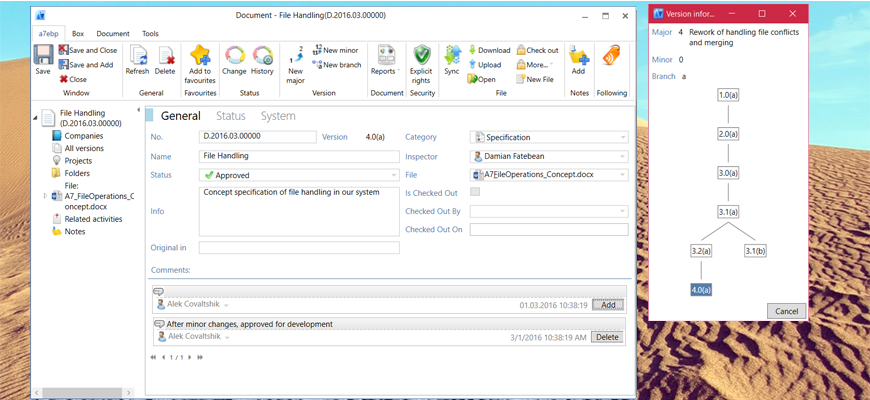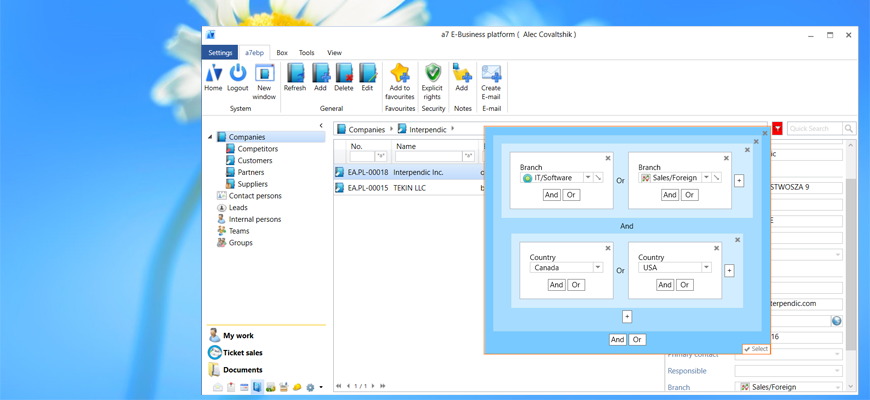Information as the resource handled by ebusiness solutions.
EBusiness
EBusiness is a general term for technology based solutions for supporting businesses. Over the years the solutions for business become very fragmented, CRM systems, document management, project management etc. all those solutions are obviously needed nowadays to run a business, but it becomes a pain when we need to integrate seperate solutions, so that they can exchange informations and functionality. An EBusiness Platform tries to join all the fragemented pieces again in one robust solution that can easily integrate different areas of running a business.
Information in business
Information as a very general concept, is one of the most important pillars of every business. Who has more information, who gets it faster and, above all, the one who knows how to use it most effectively - wins the market. The information contained in the documents and above all the heads of workers, becomes the knowledge of the company.
Hard and soft knowledge
Knowledge can mean a lot of different things. From "hard data" contained e.g. in invoices, contracts, documentation or even inventories. To softer types of information, such as contacts with current or potential customers, the principles of internal business processes, project workflows, or ways to do project management.
Prior to an effective implementation of an E-Business system
At some point in time of the development of a business, be it a small company or a major player in the market. A barrier appears which makes the use of the increasing knowledge within the company unable to use in a effective way. Because of the enormity of knowledge accumulated within the business, it becomes inefficient and costly to find the specific information you need, and generate applications of this knowledge in the form of statements, reports, or forecasts. This problem applies to both, hard and soft knowledge. The "hard knowledge" becomes contained in hundreds of files scattered across computers, employees, or binders in the office. And the "soft knowledge" becomes dispersed among dozens of mailboxes, smartphones, contacts, meetings, and many workers, both on operational and management level.
The purpose of an E-Business system implementation
The purpose for an E-Business system implementation in an enterprise, is mainly to reduce costs associated with lost of valuable time of the employees and the management, and to increase the efficiency in the use of corporate resources. Time and resources lost to the tedious search for information, create lists and reports, as well as supervising the key business processes of the company.
An effectively implemented E-Business system, causes that the business knowledge is persisted inside the company, it becomes immediately available, and consequently, the efficiency of resources usage rises up leading to faster and better key decisions for the company. Automated business processes, which run under a system becomes supervised, forcing the development of effective procedures and standards in the company.
Knowledge organization
A company, which is able to effectively use their conquered potential, must all the acquired knowledge have well organized. This allows to effectively develop good standards, procedures and business processes. Good knowledge organization, also allows in the initial stage to assess which information is potentially useful for the company, and on this basis to classify it. Which leads to even more efficient use of the gained business knowledge.
At the stage of an E-Business system implementation, based on the customer's guidelines, and the conclusions from the analysis of business operations, it is possible to organize the company's knowledge resources in the most efficient way.
The most basic arrangement of corporate data, is to classify it within the modules and functional boxes as shown below. More sophisticated classification tools are available and can be presented on demand.
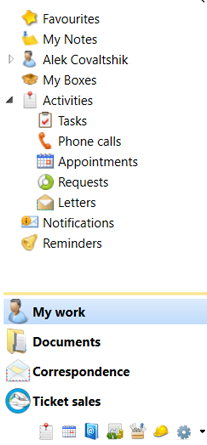
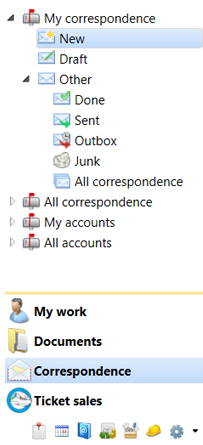
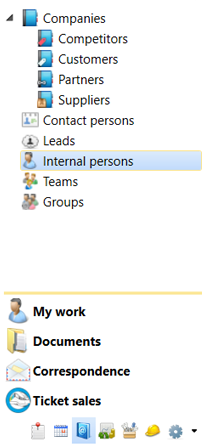
Well-organized knowledge can be easily searched based on various criteria even if there is a huge number of data behind it.
Searching information
Well-organized information, not even included in the system of a E-Business class, allows you to quickly find the necessary information currently and its classification. However, any growing business, at some point will be in possession of such a large amount of information, that without the help of database systems, it is impossible to efficiently search for required information, and for it initial classification.
The A7 EBusiness platform, focuses heavily on searching functionality. Every functionality, was designed to allow quickly and precisely find the needed information.
For quick data filtering the A7 System provides the quick search functionality, which allows you to search for data based on a single field based on a predefined list of fields and keys, it allows to quickly limit the information amount to only those which contain the provided keywords.

When the data set is extremely large, and our key search terms too general, in the A7 System we can intuitively limit the number of results by the usage of column filters.
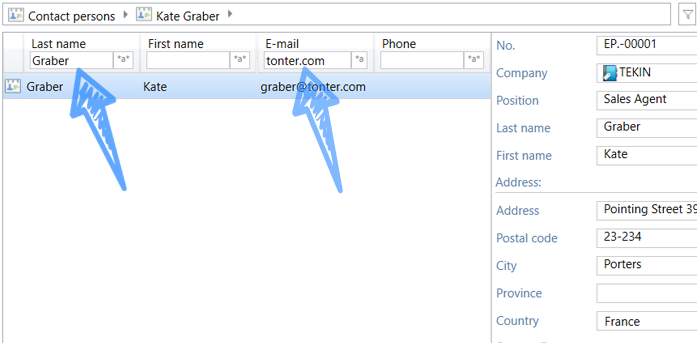
If thedata is not searched by general keywords and we are looking for information which explicitely meets specific criteria. The A7 System introduces innovative functionality of advanced filters that intuitively allows graphically define even very advanced search criterias.
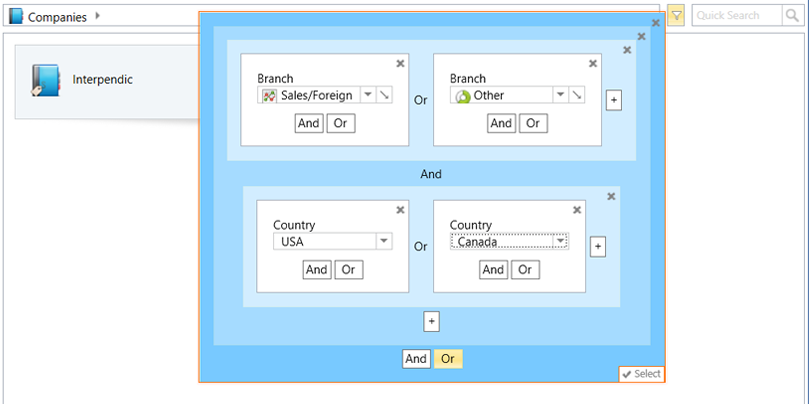

Relations between data
However, not always the information itself is valuable for current operations. Often the more important piece is the relation between different informations which allow a broader look at the analyzed data. Also, we can not always adequately define our filtering conditions to search for the desired information. But we can easily search for related data. In summary, as important as the organization, good classification and description of data, is the appropriate relation between different pieces of data.
Creation of relations and intuitive navigation through related data, is one of the pillars of the A7 EBusiness platform. In every possible point of the platform, the relationship between objects is clearly set out, making it easy to navigate within the enterprise resources presented in a digital way within the A7 EBusiness Platform.
Przeglądanie obiektów powiązanych, jest w systemie możliwe na wiele sposobów, z jednej strony, na widoku szczegółowym obiektu, z lewej strony okna wyświetla się tzw. drzewo powiązań widoczne poniżej.
Viewing relations between data is possible in the system in many ways, in the detail view of an object we will find on the left side of the window displays the so called relation tree.
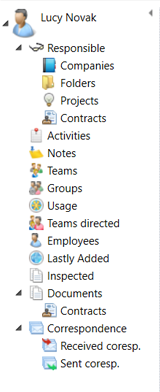

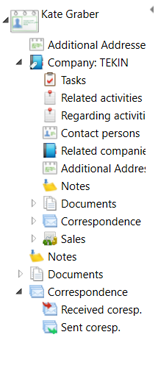
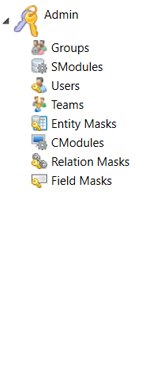
Also in the list/table view, it's possible to view data relations, through the so called relations bar, which works similary to the known breadcrumb from file explorers.
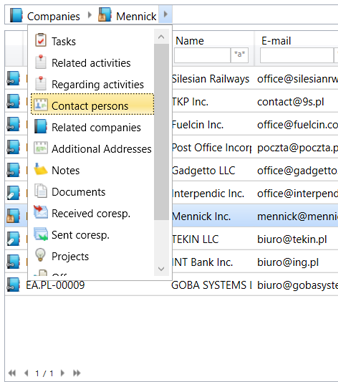
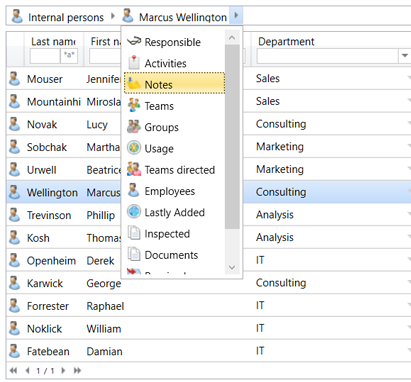

Security and data access
One of the most valuable resources of the company is knowledge. As important as good knowledge organization, is also its proper protection. Even seemingly insignificant information can with their access by the wrong hands, significantly harm the company. It's hard or even not possible to maintain the security of corporate data, in the absence of computerization of the company with proper ebusiness sytems. All data is distributed not only on the computers of employees, but also smart phones, printed documents, mailing boxes, or in the cloud.
To be able to ensure that the data on one hand is easily accessible to authorized persons, and on the other hand, absolutely not accessible to unauthorized persons, an EBusiness system should be designed with security as the main foundation of its logic.
The A7 EBusiness Platform provides maximum security when accessing data. Any downloading, creation or modification of the data is checked for access configured for each system layer.
The access to data is highly configurable in a very flexible way, a trained administrator can configure the security for the corporate data to comply to the business needs of the company.


Publishing information
Obviously the key is data security, ensuring that access to data is provided only to eligible persons. But the ability to share selected data for people inside and outside the company is also a important feature. The system should therefore be able to easily and intuitive share selected information through various channels. In the case of internal sharing, a user with appropiate permissions can change the security settings ad-hoc to allow other specified users and/or groups to access the given resources. An example of such functionality is a situation where a employee is not having default access to documents of a given category, but still he can view and/or edit a shared document chosen by the person set as responsible for this document. Sharing information outside the company - may be a simple invoice to the customer, or offer to show for a potential client. In this case, we can use much channels, such as email, web or ftp based on the client needs.
In case of internal data sharing, the A7 EBusiness platform, has this functionality in the built-in security solution. With the right permissions, users can share selected data with users that doesn't have default access to them. In case for external data sharing, thanks to the functionality of a full integration with mail servers, with proper privileges the user can intuitively share data system using emails. The data structure and the platform itself makes it also easy to develop dedicated web based customer portals for publishing data for external users.
Knowledge archivization
Even seemingly trivial information when created, like a email or documemt, may in some time be really necessary for an actual case, and then it will be necessary as soon as possible. When this information is not included in a ebusiness sytem, its recovery may be in the worst case impossible, and at best case very time consuming. Only a successfully implemented EBusiness system, gives the management certainty that no information is lost. And if necessary, it will be immediately available. Even if time passes counted in years.
Reporting
Another important functionalities of a EBusiness system are the reporting capabilities for collective presentation of the collected data. Reports, as such, may use data from different sources and present them from different angles depending on the needs.
With the help of the A7 EBusiness Platform defining various reports is highly flexible with the help of the built-in report designer. Trained administrators can define various data sources for reports, their cross-sections, conditions, calculations, and their graphical presentation. A report once defined can be viewed by authorized users on demand, or through tasks configured on the server to genereta reports in given time intervals. Reports in a simplified form can also be a part of dashboards of the system.



